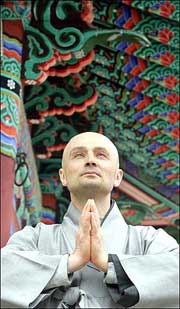Searching for Meaning of Self
By Kim Ki-tae, The Korea Times Staff Reporter, May 13, 2005
East European Monk Talks of His Relationship to Zen Buddhism
Seoul, South Korea -- Famous for encouraging his disciples to be free from any religious orthodoxy, Linji, a legendary Zen master of China in the ninth century, once wrote, ``If you meet the Buddha on your way, kill the Buddha/ If you meet the patriachs on your way, kill them.''
 << Rev. Oh Kwang - Korea Times Photo by Kim Hyun-tae
<< Rev. Oh Kwang - Korea Times Photo by Kim Hyun-tae
As if adopting such an iconoclastic viewpoint, Rev. Oh Kwang, head monk of Seoul International Zen Center, said he has little interest in the ``secular'' celebration of the Buddha.
``As a Zen monk, I don't pay much attention to Buddha's birthday,'' Oh Kwang told The Korea Times Thursday. ``I know that laypeople like to celebrate it with many decorations and events. For me, the day is just like any other day.''
What about the colorful lotus laterns strewn all over the nation? ``I like green trees and blue skies. I don't need any more colors,'' the 43-year-old monk said rather bluntly.
However, the monk from Eastern Europe who has made Korea his home, grew more serious when talking about the role of Buddhism.
``The religion needs to provide guide and instruction to all forms of lives. Most of all beliefs are pointing to the same direction, even if we cannot believe all the same things,'' he said in the interview at the center located at the foot of Mt. Samgak, northern Seoul. ``We want the world to be more peaceful and a better place for us to live in.
``And if it is a correct Buddhism, It wants to help the whole world and not just human beings but also other animals and other beings.''
Oh Kwang is one of many foreign students of Rev. Seung Sahn, late Korean Zen master (1927-2004). The guru gave the name of Oh Kwang or ``??'' meaning ``Light of Enlightenment.''
Born in 1962 to a Christian family in then Yugoslavia, Oh Kwang, then called Vladan Velimirovic, studied philosophy in the early 1980s, and enjoyed reading works by Aristotle and Plato in Belgrade University.
One day, the young Serb got a fatal touch with the Oriental religion. ``I found Buddhist books in the library in English and in Yugoslavian language. When I read them, I somehow immediately felt that I wanted to study more,'' he said.
He then saved some money and travelled around Europe to learn more. It was in in 1987 when he saw Seung Sahn giving an open lecture at Warsaw Zen Center in Poland.
``He was a Zen master, having wisdom and willingness to help and guide me.'' Oh Kwang said. ``I had confidence that he can help me and I followed him.'' Then two years later, he became a monk with the guidance of the Korean.
Oh Kwang then practiced Zen travelling around the world, namely France, England, Thailand and Sri Lanka between 1990 and 1998, when he came to Korea and met his spiritual guru again.
Experiencing various forms of Buddhism around the globe, he said the religion, of course, takes different forms in each culture.
``Different countries have different culture, ethics, temperament. Just like you pour water into different cups, then the water takes the shapes of the different cups,'' he said.
``Compared with other versions, Korean Buddhism is more relaxed, open and wide. It accepts different kinds of people and does not have very strict rules,'' he said. ``But the tradition in its meditation halls is very strict. There, you should spend many hours sitting motionless, comtemplating your `hwa du,' '' he sad. Hwadu is a Buddhist term in Korean indicating a key question alloted for each Zen practitioner.
Then, what is the main hwadu for which the monk is seeking an answer? ``It is `Who am I,' '' he said. ``This is what we all received from Rev. Seung Sahn and other Korean Zen masters. As we meditate, we go back to that very question. There are many other questions, but all of them come from this one,'' he said. ``It's the question you will never finish meditating on.''
To his blue eyes, a series of recent corruption scandals in the Chogye order, the nation's largest Buddhist sect, is something you need to keep a distance from. ``When there were problems with monks fighting in Chogye-sa Temple a couple of years ago, we foreign monks asked Rev. Seung Sahn, what we should do. Should we take a side or should we just stay out of it.
``He said, `Fighting monks fight. Meditating monks meditate. Don't mix with fighting monks.' So, I think all the foreign monks in the center didn't really have much to do with that,'' he said.
He also added that he could do very little about that as foreigner. ``I work on my mind through meditation, which I think will help more than if I go out and try to solve the problems in the order,'' the monk said.
The cleric said one day he wants to come back to his country to share what he believes in. ``I want to establish a Buddhist temple back in my hometown in the future. I don't know when, maybe, in four or five years.''
``I just try to find ways to help other people and for other people to help myself.''
``I think I saw a lot of suffering of people who don't exactly know what to do with their lives. They have pain inside but cannot get rid of it,'' he said.

 << Rev. Oh Kwang - Korea Times Photo by Kim Hyun-tae
<< Rev. Oh Kwang - Korea Times Photo by Kim Hyun-tae